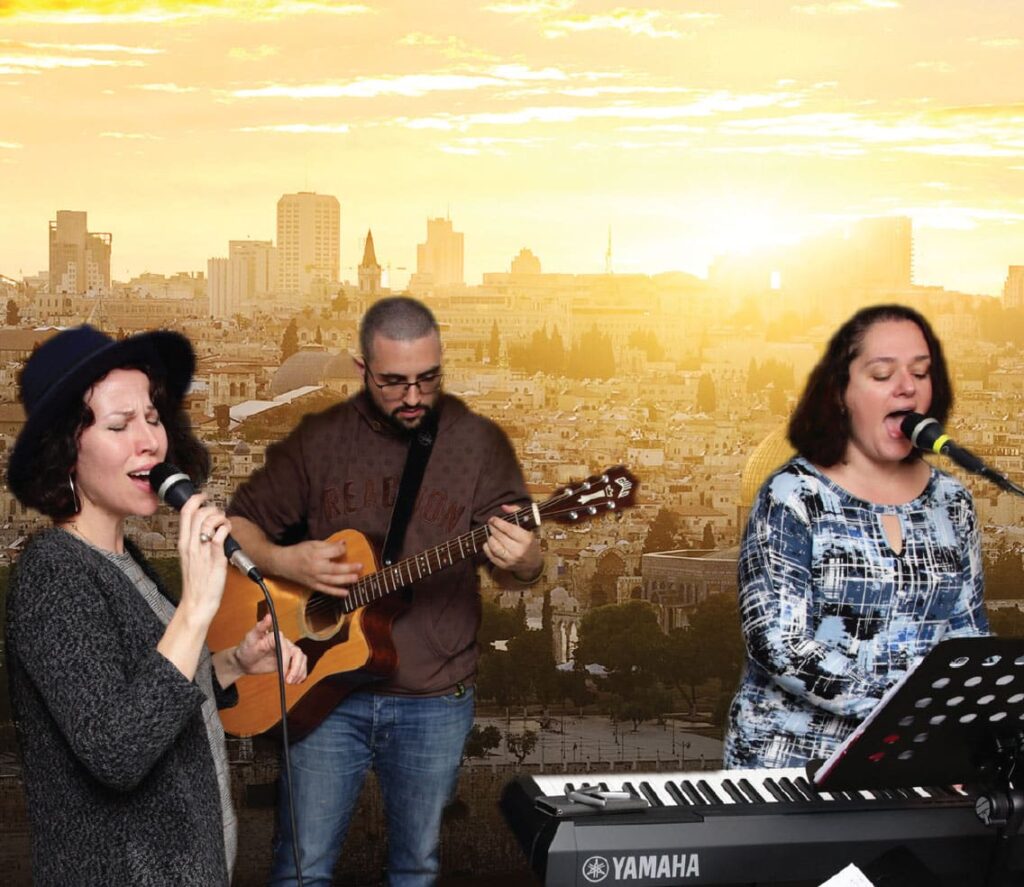The Story of Messianic Music in Israel

Worshiping the Messiah through music has been a crucial part of life for followers of Jesus (Yeshua) since the first century. Paul exhorts believers in Messiah to be filled with the Spirit and speak to one another in psalms, hymns, and spiritual music (Ephesians 5:18–19). Honoring God with our voices through song is still essential to worshiping Him.

When Jewish people began to return to Israel in the 1800s, new music also flourished in the land. Today, Israeli music is hard to describe because it is so diverse and continually changing due to ongoing waves of new immigrants who bring their own distinctive styles. Music in Israel thus draws on influences from various places, including the Middle East, Central and eastern Europe, North and South America, and North Africa. Israeli musicians and composers’ creativity and inventiveness indeed stem from around the world.
Messianic Jewish people from around the globe also immigrated to Israel, and it was only natural this small group wanted to express its faith in Jesus as Messiah by singing in the revived Hebrew language. The emergence of Messianic worship songs began in the land even before Israel became a nation. The development of modern Israeli Messianic worship is like flowers blooming in a newly planted botanical garden.
Ann Hilsden is not only a historian of modern Israeli Messianic worship, but she has also contributed to its nurture and growth. She and her husband, Wayne, moved to Israel in 1983 and established King of Kings Community in Jerusalem, from which much Messianic music has arisen. Ann has carefully documented Messianic music in Israel. In one of her articles, she describes the development of a unique Hebrew hymnal Moshe Ben Meir created as early as 1950. Ben Meir also wrote the first modern Messianic Hebrew worship song, “He Comes with the Paratroopers.”
The next crucial stage for the body of barely 500 Messianic Jewish believers came in the 1960s with the publishing of the Blue Hymnal, which included 212 songs. The translation and editing of hundreds of worship songs was a daunting task. Soon after, Arieh Bar David, a young Messianic believer and competent musician, put together a new compilation of more than 268 worship songs. He carefully worked through the musicality of the melodies while others assisted with translating lyrics into Hebrew. Victor Smadja, an elder at the Jerusalem Messianic Assembly and founder of Yanetz Press, published this new hymnal, which became the standard for the growing Messianic community in Israel. It was well-used and became known as the Brown Book.
The next significant development came in the 1970s and 80s when Bar David began writing a new generation of worship songs with many new immigrants to Israel. Most notable were David and Lisa Loden, Batya Segal, and Elisheva Shomron. With abundant talent and love for the Messiah, a series of recordings, worship music, concerts, and symposiums emerged. Ann Hilsden describes this Spirit-led development in the following way:
One cannot explain this kind of musical renaissance simply in human terms. Surely it was more than imparting musical and lyrical skills and encouraging words. I see this as a divine “kiss” on a newly regathered body of believers, in their own land, and for their own expression.

During the following years, the Messianic body in Israel produced a flood of original songs, many of which became part of regular worship in their congregations. In the 1990s, the Peniel congregation in Tiberias collected many new pieces and prepared each in a new format with an interlinear translation. These songs were published in a collection called Zimrat Haaretz L’Yeshua.
Today, the number of believers has soared to greater than 25,000, with more than 200 congregations spread throughout the Holy Land. The Messianic Jewish Alliance of Israel sponsors regular concerts every two years featuring new musical artists and their songs. There are also several professional recording studios for Messianic Jewish musicians. In addition, the Yuval Ministry in Jerusalem, now led by Yoel and Liel Davis, provides music lessons to children and guidance for new musicians who need assistance in composing and recording music.
Some Israeli Messianic groups and artists like MIQEDEM, SOLU, Joshua Aaron, Sarah Liberman, and Emanuel Roro are known internationally for producing and performing innovative and inspirational worship songs. Those who have led the way mentor and assist these emerging musicians. The unity and cooperation among Israeli Messianic worship leaders and performers are also encouraging.
The vibrant and dynamic nature of Israeli Messianic worship music reflects the healthy growth of the body of Messiah in Israel. The artists are writing songs reflecting the language and culture of their country, and both young and older believers in Messiah sing along. Israelis are praising the name of the Lord in the Promised Land. We long for the day when “all Israel will be saved,” and we will praise the name of the Lord together (Romans 11:26).
Sign up to receive our email newsletters
Get the latest news from Israel, insights from Dr. Mitch Glaser, international ministry reports, as well as videos and podcasts, downloadable resources, discounts in our online store, and much more!